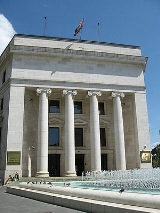
Croatian National Bank
Encyclopedia
The Croatian National Bank ( xr̩ʋatska narɔdna baŋka or HNB) is the central bank
of the Republic of Croatia.
HNB was established by the Constitution of Croatia
which was passed by the Croatian Parliament on 21 December 1990. Its main responsibilities are maintaining the stability of the national currency, the kuna
, and ensuring general financial liquidity within the country. HNB also issues banknote
s and holds the national monetary reserves
. In performing its duties HNB acts as an independent institution responsible to the parliament. The bank has a share capital of 2,500,000 of Croatian kuna
s (near 485,292 USD). HNB acts in accordance with Law on Croatian National Bank.
, made on 21 December 1990, determined in article 53, Croatian National Bank as central bank of Republic of Croatia and found its responsibilities: "Croatian National Bank is central bank of Republic of Croatia. Croatian National Bank is responsible, within its rights and duties, for stability of the currency and for liquidity of payments in state and abroad. Croatian National Bank is independent in its activity and responsible to Croatian Sabor
. Profits made by Croatian National Bank belong to Croatian state budget. Position of Croatian National Bank is made by law." By amendments of Constitution of Croatia in 1997, Bank's earlier name National Bank of Croatia ( is changed to Croatian National Bank )
Central bank
A central bank, reserve bank, or monetary authority is a public institution that usually issues the currency, regulates the money supply, and controls the interest rates in a country. Central banks often also oversee the commercial banking system of their respective countries...
of the Republic of Croatia.
HNB was established by the Constitution of Croatia
Constitution of Croatia
The current Constitution of the Republic of Croatia was adopted by the Parliament of the Republic of Croatia on December 22, 1990. It replaced the Constitution of 1974 ratified in socialist Yugoslavia...
which was passed by the Croatian Parliament on 21 December 1990. Its main responsibilities are maintaining the stability of the national currency, the kuna
Croatian kuna
The kuna is the currency of Croatia since 1994 . It is subdivided into 100 lipa. The kuna is issued by the Croatian National Bank and the coins are minted by the Croatian Monetary Institute....
, and ensuring general financial liquidity within the country. HNB also issues banknote
Banknote
A banknote is a kind of negotiable instrument, a promissory note made by a bank payable to the bearer on demand, used as money, and in many jurisdictions is legal tender. In addition to coins, banknotes make up the cash or bearer forms of all modern fiat money...
s and holds the national monetary reserves
Foreign exchange reserves
Foreign-exchange reserves in a strict sense are 'only' the foreign currency deposits and bonds held by central banks and monetary authorities. However, the term in popular usage commonly includes foreign exchange and gold, Special Drawing Rights and International Monetary Fund reserve positions...
. In performing its duties HNB acts as an independent institution responsible to the parliament. The bank has a share capital of 2,500,000 of Croatian kuna
Croatian kuna
The kuna is the currency of Croatia since 1994 . It is subdivided into 100 lipa. The kuna is issued by the Croatian National Bank and the coins are minted by the Croatian Monetary Institute....
s (near 485,292 USD). HNB acts in accordance with Law on Croatian National Bank.
Foundation
Constitution of CroatiaConstitution of Croatia
The current Constitution of the Republic of Croatia was adopted by the Parliament of the Republic of Croatia on December 22, 1990. It replaced the Constitution of 1974 ratified in socialist Yugoslavia...
, made on 21 December 1990, determined in article 53, Croatian National Bank as central bank of Republic of Croatia and found its responsibilities: "Croatian National Bank is central bank of Republic of Croatia. Croatian National Bank is responsible, within its rights and duties, for stability of the currency and for liquidity of payments in state and abroad. Croatian National Bank is independent in its activity and responsible to Croatian Sabor
Parliament of Croatia
The Parliament of Croatia or the Sabor is the unicameral representative body of the citizens of the Republic of Croatia and legislature of the country. Under the terms of the Croatian Constitution, represents the people and is vested with the legislative power...
. Profits made by Croatian National Bank belong to Croatian state budget. Position of Croatian National Bank is made by law." By amendments of Constitution of Croatia in 1997, Bank's earlier name National Bank of Croatia ( is changed to Croatian National Bank )
Governors
- Ante Čičin-Šain (August 1990 – May 1992)
- Pero Jurković (June 1992 – February 1996)
- Marko ŠkrebMarko ŠkrebMarko Škreb was Governor of the Croatian National Bank from 1996 to 2000.Škreb graduated from the University of Zagreb Faculty of Economics in 1980. After spending time at the Boulder Economics Institute and University of Pittsburgh he returned to Zagreb and received his doctorate in 1990...
(March 1996 – July 2000) - Željko RohatinskiŽeljko RohatinskiŽeljko Rohatinski is current Governor of the Croatian National Bank. He succeeded Marko Škreb in July 2000.Rohatinski graduated from the University of Zagreb Faculty of Economics in 1974, where he also received his doctorate in 1988 with a thesis titled Vremenska dimenzija ekonomske aktivnosti...
(July 2000 – present)

